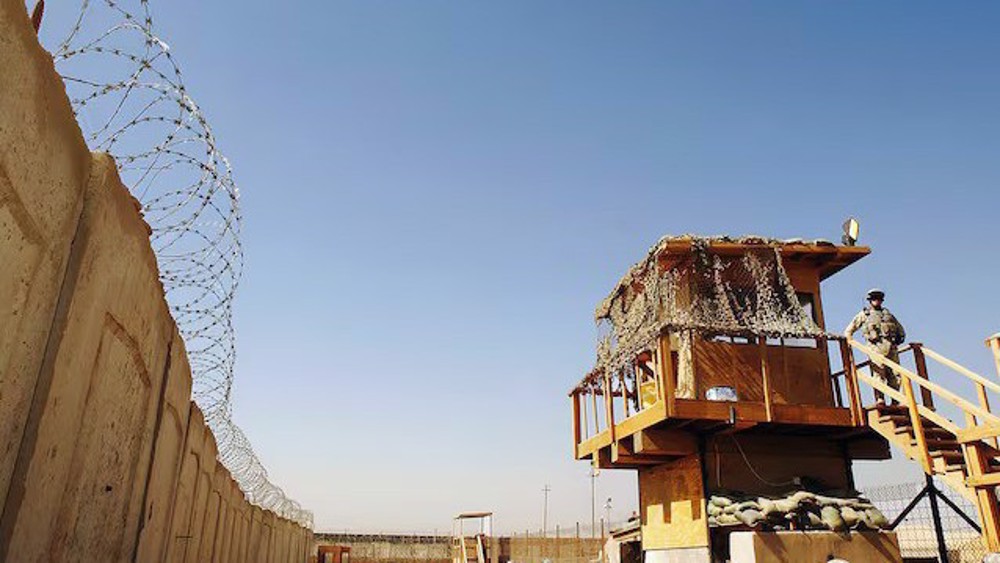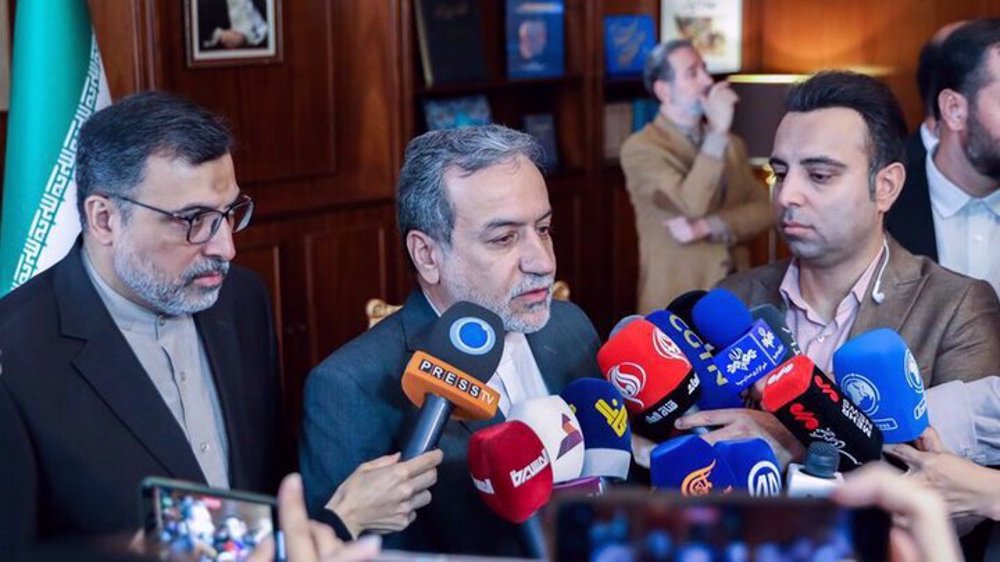US rewards Israeli regime with more weapons for breaching 30-day Gaza aid ultimatum
By Alireza Akbari
During a meeting on Tuesday at the White House, Israeli President Isaac Herzog lavished praise on his outgoing American counterpart Joe Biden for his steadfast support of Israel, both in "words and deeds,” referring to Biden as “an incredible friend of Israel for decades.”
During the meeting, which coincided with the expiration of the US 30-day deadline for Israel to enhance aid flow to Gaza, Herzog presented Biden with a lucrative gift.
“You are clearly a Zionist, Mr. President," Herzog told Biden, echoing his own words.
Despite the Biden administration vowing reduction in US military assistance if the Israeli regime failed to allow aid into the Gaza Strip in 30 days, the deadline expired without any change in the US policy.
Herzog told reporters in Washington on the sidelines of his meeting with Biden that the US government remains committed to ensuring the “security” of the Israeli regime.
In mid-October, Secretary of State Antony Blinken and Defense Secretary Lloyd Austin announced a crucial deadline to their Israeli counterparts amid the dire humanitarian situation in the Gaza Strip, with the regime obstructing nearly 90% of humanitarian flow between the northern and southern regions.
Israel ignores Biden’s 30-day Gaza humanitarian aid deadline@RaminMazaheri2 reports from Washington DC. pic.twitter.com/TVwQaztDlT
— Press TV 🔻 (@PressTV) November 13, 2024
The letter outlined that Israel needed to take "urgent and sustained actions" to improve humanitarian conditions in Gaza within 30 days.
Specifically, it called for the daily entry of at least 350 trucks of aid, the opening of a fifth border crossing, enhanced security for aid sites and the movement of humanitarian workers, an end to the isolation of northern Gaza, and the facilitation of movement for individuals in al-Mawasi to travel inland.
Furthermore, the letter highlighted US laws that could "restrict military assistance" to those impeding the delivery of humanitarian aid.
As the November 12 deadline passed, the State Department announced that it would not suspend military assistance to Israel and stated that they had "not made an assessment that the Israelis are in violation of US law," giving a clean chit to the genocidal regime in Tel Aviv.
The US decision not to impose reductions in military assistance to the Israeli regime can be understood within the broader framework of its unwavering support for Israel since October 2023, according to experts, as the death toll continues to surge in the territory.
Washington has maintained its "iron-clad" military support for the Tel Aviv regime amid the genocidal war on Gaza, providing arms worth tens of billions of dollars, breaking all records.
This contradiction between rhetoric and reality raises significant questions about the United States' true commitment to addressing humanitarian issues in Gaza, according to human rights activists.
The United States has significantly bolstered its military support for Israel since early October 2023.
Shortly after the Israeli regime unfolded a genocidal campaign in the region, the US began deploying warships and warplanes, pledging to provide Israel with "whatever it needs."
“Famine imminent in Northern Gaza”
— Press TV 🔻 (@PressTV) November 13, 2024
As Israeli forces push deeper into northern Gaza, UNRWA warns of a dire humanitarian situation there, saying that famine is imminent.#GazaGenocide pic.twitter.com/XRBkonhfJB
By October 10, the commitment deepened, as additional ships were dispatched, and more personnel in the US were put on alert for possible deployment.
Secretary of Defense Lloyd Austin further bolstered the US military presence on October 12 by ordering about 2,000 troops to be prepared for potential deployment to Israel. This military buildup included five shipments of American weapons and equipment arriving in Israel by October 17.
On October 18, the US wielded its veto power in the United Nations Security Council, blocking a resolution that called for a pause in hostilities. The following days saw President Biden actively advocating for increased military support, urging Congress to approve more aid.
On October 20, Biden formally requested 14 billion in military aid for Israel, part of a larger 105 billion package intended for various global needs.
The Pentagon continued its military readiness by announcing the deployment of Terminal High Altitude Area Defense (THAAD) systems and additional Patriot batteries to the region on October 21.
By November 2023, the US House of Representatives responded to the intensified support efforts by approving a plan allocating $14.5 billion in military aid for Israel, further cementing the US's commitment to its ally amid the ongoing war on Gaza.
Despite the extensive military support provided to Israel, the Biden administration has attempted to project concern for the humanitarian situation in the West Asia region.
In February 2024, the administration issued a national security directive requiring written assurances from Israel that it was using US-supplied weapons in accordance with international law.
This move came amid growing scrutiny of Israel's acts of aggression and their impact on civilians.
By March 2024, the US began advocating for an immediate and sustained ceasefire, linking it to the release of hostages. However, Congress simultaneously approved $3.8 billion in military aid to Israel.
On March 29, despite escalating tensions, the Biden administration authorized the transfer of billions of dollars worth of bombs and fighter jets to Israel.
Watch: U.S. has used its veto power 44 times in favor of #Israel!#QudsDay4Return pic.twitter.com/OKa3KI0OJI
— Press TV 🔻 (@PressTV) June 8, 2018
In April, a supplemental appropriations act provided an additional $8.7 billion in military aid to Israel, further solidifying the US commitment to its ally.
By May, the White House announced a pause in the shipment of large bombs to Israel in anticipation of a pending assault on Rafah, though it indicated that other military assistance would continue.
The administration's support for Israel continued to grow, with the announcement of $20.3 billion in new arms sales agreements in August.
Since October 2023, the United States has consistently approved military aid to Israel, reaching a record number of 17.9 billion in security assistance, including $6.8 billion in Foreign Military Financing (FMF), $5.7 billion for missile defense systems, $1 billion for heavy weaponry, and $4.4 billion to replenish US weapon stocks transferred to Israel.
During this period, the US has facilitated over 100 military aid transfers to Israel. These shipments have encompassed a wide array of munitions, including artillery shells, precision-guided bombs, and 2,000-pound bunker-buster munitions.
Israel has benefited from expedited deliveries drawn from a US strategic stockpile since the 1980s, underscoring the depth of the military partnership between Washington and the Tel Aviv regime.

At least 65 Palestinians killed inside Israeli prisons

Israeli forces kill three Palestinians in intensified West Bank raids

Nearly 600 children killed in renewed Israeli assault on Gaza: UN agency
Syria arrests Islamic Jihad officials after US ties sanctions relief to ban on Palestinian groups
Gaza children dying not only from bombs, but hunger: Health Ministry
Israeli strikes kill nearly 10 Gazans, including two children, in new aggression
VIDEO | Rome talks & sword breaks in Gaza
VIDEO | Ireland remembers anti-colonial uprising
Day of Rage: Hamas calls on all Palestinians to attend pro-Gaza rallies
Certain groups manipulating Iran-US talks, goading US into making ‘maximalist demands’: FM
US warplanes strike Yemeni capital in new acts of aggression












 This makes it easy to access the Press TV website
This makes it easy to access the Press TV website